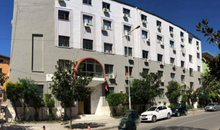
 Flash News
Flash News
Ceno Klosi with over 800 stolen votes, Balluku finds the reason is the tiredness of the counters
"Fast & Furious" in the former Block, police chase an Audi Q8, 4 cars collide
Car hits two tourists on a motorcycle in Fushe Arrëz, one of them dies
Serious accident in Thumanë, one dead, 3 injured
Durrës Court suspends the director of Pre-University Education from duty
"Theatre of Prices" a play about the lives of citizens, expert and student for Politikon: Stress, an inseparable part of everyday life

Prepared by Neta Fero
In recent years, the unstoppable rise in prices has made everyday life increasingly difficult.
From basic food products to services and rent, everything has become more expensive, while household incomes have failed to keep up with inflation.
Economic expert, Selami Xhepa, when asked by Politiko.al, sees the solution only in a long-term strategy for indexing salaries and pensions.
"Only the permanent indexation of salaries and pensions at a rate higher than inflation, for at least a period of more than 5 years, could affect an improvement and relief of this aggravated social situation in the country," he stated.
According to him, if this measure is not implemented, families will continue to face a deepening economic crisis.
Meanwhile, for young people, and especially students, the situation has become even more dire. A student, who lives and studies in Tirana, told Politiko.al that she cannot cope financially.
“I deprive myself of some things I want because I can't afford them,” she says.
With skyrocketing prices for rent, food, and transportation, many students are forced to limit their spending, thus affecting the quality of their lives and studies.
If the government does not take concrete measures to stop the decline in purchasing power, poverty and social inequality will continue to deepen.
Excerpt from the interview with expert Selami Xhepa
What are the main factors leading to price increases?
Expert: "The phenomenon of inflation – the increase in the general level of prices in the economy – began after the COVID-19 pandemic and was greatly reinforced by the conflict in Ukraine. The causes are numerous and complex, including demand factors that have been driven by active plans by governments to boost consumption after the pandemic. But supply factors have been more powerful: the restructuring of global production and trade systems, as well as the increase in the costs of production factors, energy and labor costs, have led to an unstoppable increase in prices."
Which products or services have experienced the greatest price increases?
Expert: "Undoubtedly, two groups of goods have been most strongly affected: energy and food goods. These two categories have had serious effects on the purchasing power of consumers, but have hit those with low incomes hardest, due to the weight that the purchases of these goods occupy in family budgets."
Is the government taking sufficient measures to help citizens?
Eksperti: "Politikat qeveritare të kompensimeve që u bënë për pensionistët dhe familjet që përfitojnë ndihmë ekonomike e zbutën lehtësisht dhe vetëm përkohësisht barrën e çmimeve të papërballueshme. Megjithatë, problemi qëndron akoma dhe është shqetësimi themelor i familjeve."
Si po ndikohen bizneset e vogla dhe të mesme nga kjo situatë?
Eksperti: "Të ardhurat nga puna në sektorin privat janë rritur shumë më pak se inflacioni, duke dëshmuar se rënia e fuqisë blerëse është një fakt i shkatërruar që përkeqëson situatën ekonomike të familjeve. Raportimet e INSTAT kanë treguar se familjet në rrezik varfërie përfshijnë gati gjysmën e popullatës."
A është rritur niveli i varfërisë apo pabarazisë ekonomike në shoqëri?
Eksperti: "Vetëm indeksimi permanent i pagave dhe pensioneve me një normë më të lartë se inflacioni për të paktën një periudhë më shumë se 5 vjeçare mund të ndikonte në përmirësimin dhe lehtësimin e kësaj gjendjeje të rënduar sociale."
Pjesë nga intervista me studenten Xh.F
Studentja Xh.F. flet për përvojën e saj dhe sfidat që ka përballuar gjatë kësaj periudhe të vështirë ekonomike:
Si ka ndikuar rritja e çmimeve në buxhetin tuaj mujor si student?
Studentja: "Si dhe tek çdo student, edhe për mua ka një ndikim relativisht të madh, pasi çmimet kanë arritur kulmin. Pa ndihmën financiare të familjes, nuk arrij dot të mbuloj të gjitha shpenzimet mujore që më nevojiten."
A jeni detyruar të kufizoni shpenzimet për gjëra jo të domosdoshme?
Studentja: "Patjetër që më është dashur të reduktoj gjëra që nuk janë shumë të domosdoshme, për të lënë vend për ato të nevojshmet."
A keni vështirësi në mbulimin e kostove të qirasë, ushqimit apo transportit?
Studentja: "Të gjithë e dimë që çmimet e qerasë nuk kanë ku të shkojnë më lart. Patjetër që nëse nuk e ndaj banesën me persona të tjerë, është e pamundur që një student ta mbulojë vetë të gjithë kostot. Për ushqimin dhe transportin, deri diku nuk kam aq shumë probleme."
A keni filluar të punoni për të mbuluar shpenzimet?
Studentja: "Në fillim kam punuar, por nuk arrija dot ta balancoja kohën mes punës dhe shkollës. Tani jam duke jetuar vetëm me ndihmën e të ardhurave të familjes."
A ndjeni stres apo ankth për të ardhmen tuaj financiare dhe profesionale?
Studentja: "Sigurisht, ankthi dhe stresi janë bërë pjesë e pandashme e përditshmërisë sime. Mendimet se si do të jetë jeta ime pas përfundimit të shkollës, marrjes së diplomës, pozicionimit në punë dhe nëse ky profesion do të më japë një të ardhme të mirë në Shqipëri, janë gjithashtu shqetësime të mëdha."
Through these interviews, a clear picture emerges of the consequences that rising prices are bringing to the lives of citizens, particularly affecting those in the most vulnerable groups, such as students and low-income families.
Experts suggest that a profound change is needed to cope with this economic crisis that is deepening every day.
Latest news





Lufta në Gaza/ Pse Netanyahu do vetëm një armëpushim 60-ditor, jo të përhershëm?
2025-07-02 21:56:08
US suspends some military aid to Ukraine
2025-07-02 21:40:55



Methadone shortage, users return to heroin: We steal to buy it
2025-07-02 20:57:35
Government enters oil market, Rama: New price for consumers
2025-07-02 20:43:30
WHO calls for 50% price hike for tobacco, alcohol and sugary drinks
2025-07-02 20:41:53







Israel agrees to 60-day ceasefire in Gaza, but many unanswered questions remain
2025-07-02 18:35:27
The weather in Germany is going "crazy", temperatures reach 40°C
2025-07-02 18:22:21

"Fast & Furious" in the former Block, police chase an Audi Q8, 4 cars collide
2025-07-02 17:59:25
"Birth on a tourist visa? US Embassy warns Albanians: This is prohibited!"
2025-07-02 17:48:16


BIRN: Fier recount reveals vote trafficking within open political party lists
2025-07-02 16:57:19

CEO and former director of 'Bankers Petroleum' arrested in Fier
2025-07-02 16:40:42
Car hits two tourists on a motorcycle in Fushe Arrëz, one of them dies
2025-07-02 16:33:23



Fire at the Elbasan Incinerator Landfill, Prosecution Launches Investigations
2025-07-02 15:34:54
What you need to know if you travel to a country with active volcanoes
2025-07-02 15:33:03



EU proposes 90% reduction in greenhouse gases by 2040
2025-07-02 14:50:23
Europe is burning from the heat / Italy and France are on maximum alert
2025-07-02 14:36:52

Moscow's contradictory statements: Is the friendship with Vučić breaking down?
2025-07-02 14:21:05
'I lost my battle': Sea warming is killing fishing in Albania
2025-07-02 14:08:35
Sekretet kimike që ndihmojnë në mbajtjen e mjaltit të freskët për kaq gjatë
2025-07-02 14:01:26

Denmark makes historic decision to make military service mandatory for women
2025-07-02 13:44:33
The appeal of the GJKKO leaves former judge Pajtime Fetahu in prison
2025-07-02 13:30:20
Productivity losses could reduce GDP by 1.3% as a result of extreme heat
2025-07-02 13:21:04
He abused his minor daughter, Zamir Meta is left in prison
2025-07-02 13:04:04

Waste burning in Elbasan, Alizoti: They are poisoning people and stealing money
2025-07-02 12:48:39
Civil disobedience continues in Serbia, dozens of people detained
2025-07-02 12:40:32
Rama's government was born under the sign of garbage and will end like this
2025-07-02 12:28:09
Water prices increase in the municipalities of the Elbasan region
2025-07-02 12:13:38
Civil disobedience continues in Serbia, what is happening in Belgrade?
2025-07-02 12:07:44
Serious accident in Thumanë, one dead, 3 injured
2025-07-02 11:54:42
Durrës Court suspends the director of Pre-University Education from duty
2025-07-02 11:49:27
Plenary session on Thursday, what is expected to be discussed
2025-07-02 11:36:43
Europe is burning from heat waves/ What is the 'thermal dome' phenomenon?
2025-07-02 11:26:25
Wanted by Italy for murder, 45-year-old arrested in Vlora
2025-07-02 11:19:31
Fire situation, 28 fires reported in 24 hours, 2 still active
2025-07-02 11:13:20
"Buka" file, preliminary hearing for Ahmetaj postponed to July 17
2025-07-02 11:03:30


Baçi: Belinda Balluku and Ceno Klosi, the most dangerous "gangs" in Fier
2025-07-02 10:32:09
Zamir Meta, suspected of sexually abusing his daughter, arrives in court
2025-07-02 10:21:33

Trump: Israel has agreed to a 60-day ceasefire in Gaza
2025-07-02 10:01:55
Fire continues at Elbasan landfill
2025-07-02 09:51:13

Dates to note during July, important events will occur
2025-07-02 09:31:45
The hearing for Jorgo Goro's claim is postponed
2025-07-02 09:24:19



Foreign exchange, the rate at which foreign currencies are sold and bought
2025-07-02 08:42:31

52% of pensioners did not receive full pension in 2024
2025-07-02 08:27:18
Horoscope, what do the stars have in store for you today?
2025-07-02 08:13:36
Hot weather, Wednesday brings high temperatures
2025-07-02 07:59:16
Morning Post/ In 2 lines: What mattered yesterday in Albania
2025-07-02 07:46:15
Heatwave sweeps across Europe, Spain and England record hottest June ever
2025-07-01 22:57:41






Golem and Qerret without water at the peak of the tourist season
2025-07-01 21:09:32

Euractiv: Italy-Albania migrant deal faces biggest legal challenge yet
2025-07-01 20:53:38
BIRN: Brataj and Fevziu victims of a 'deepfake' on Facebook
2025-07-01 20:44:00

Vlora by-pass, work delays and cost increases
2025-07-01 20:24:29



Milan are expected to give up on the transfer of Granit Xhaka
2025-07-01 19:41:25

